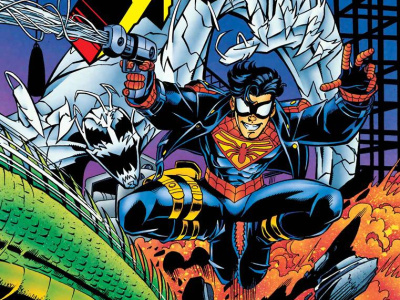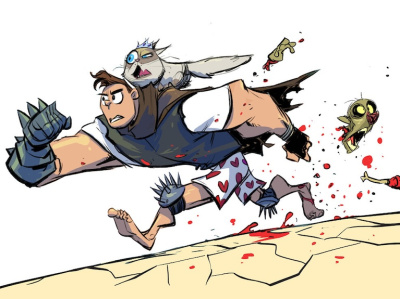 Chris Walsh of B-Bop Comics South in Prairie Village, Kansas read the recent article about Hastings Entertainment expanding into comic books (see "Hastings Entertainment Adds Comics") and had this to say:
Chris Walsh of B-Bop Comics South in Prairie Village, Kansas read the recent article about Hastings Entertainment expanding into comic books (see "Hastings Entertainment Adds Comics") and had this to say:I've read with no great worry about the expansion of comics into the national music/movie store chain Hastings. Can any brick-and-mortar comic store afford the competition provided by a national chain with a built in customer base and low rent? It seems unlikely doesn't it? But perception isn't always reality.
In my mind, will Hasting be any more successful than, say, Barnes & Noble or Borders? Sure, when those chains started carrying manga and trade paperback in bulk it had an immediate negative impact on the Direct Market. But one needs to look at the long haul. Now Borders is dealing with an incredibly tenuous financial position in its overall market. And I think carrying comic book related materials contributed to that.
From the cost to carry the books, to the payroll and materials paid for to dedicate space to the material, in the end it seems to have backfired. I see ever-decreasing space for both manga and trade paperbacks in Borders--even the Borders located less than a mile from the store in which I work. Meanwhile, trends show that manga sales in the "Big Box" stores have taken a perilous dip of late. Even though much of the product in the "Big Box" market, unlike here in the Direct Market brick and mortar stores, is returnable, they are facing a whole different set of issues. Imagine paying your staff for the time it takes to unload a box of trade paperbacks that include books like X-Men: Fairy Tales or Lockjaw and the Pet Avengers. How many DM stores out there are ordering those trades in bulk? My guess is not many.
And as one other commentator pointed out, he is facing a loss of pulls because readers can stand around and read these books "off the rack at Hastings." I wonder if you asked the good people at B&N or Borders about the time spent on shelving books and catering to possible clients who are just there for a free read versus the inexperience of the staff with the source material and time spent reorganizing and re-alphabetizing books, might they say this contributed to the downsizing of these sections over the last year or so?
So between inexperience, wasted time on unnecessarily stocked (toxic) product and clean up (whether re-shelving or returning to Diamond), customers loitering with no intent to buy, etc., is it really worth the hassle? More importantly, does it really affect the Direct Market?
Again, another comment has already made mention of the bizarre timing of this move. A chain store that dabbles in second hand movie and music product due to the death of the mainstream business of both those industries--due to digitalization is now going to leap into the comic business just as digitalization threatens to replace the physical product? Really strange, isn't it?
Hastings will carry 32 linear feet of comics. That would cover any two of the three sections we carry (Marvel, DC, small press). Will their employees know anything about the product? Will the person in charge of ordering know what books sell and what quantities to order? Plus 32 feet of back issues--which isn't bad, but conventional wisdom is that most brick and mortar stores carry more, including a better selection and many older books than what you're likely to find at Hastings. How will Hastings handle back issue pricing? Then add in 44 feet of trade paperbacks, graphic novels and manga books.
Which leads me to ask, just how much of this stuff is going to be returnable? Because if not, Hastings is likely going to have to figure out what to do with inevitable overflow. If customers are going in to read off the rack and if manga sales continue to fall, then the inevitable consequence is that Hastings will have a large amount of unsold merchandise.
Our store, like many across the country and here in the deep Midwest, is feeling the financial pinch. Rising prices on goods and lost jobs are resulting in fewer pre-orders. Higher price points seem to be creating a reduction in casual buyers. But our store has survived under its current ownership for about 6 years while co-existing within a mile of Borders, Vintage Stock and Half-Price Books, all of whom dabble in comic related merchandise. In the end, the idea that Hastings will be the franchise to somehow carve out a niche as the first national comic book "chain" store seems highly unlikely.
The opinions expressed in this article are solely those of the writer, and do not necessarily reflect the views of the editorial staff of ICv2.com.







